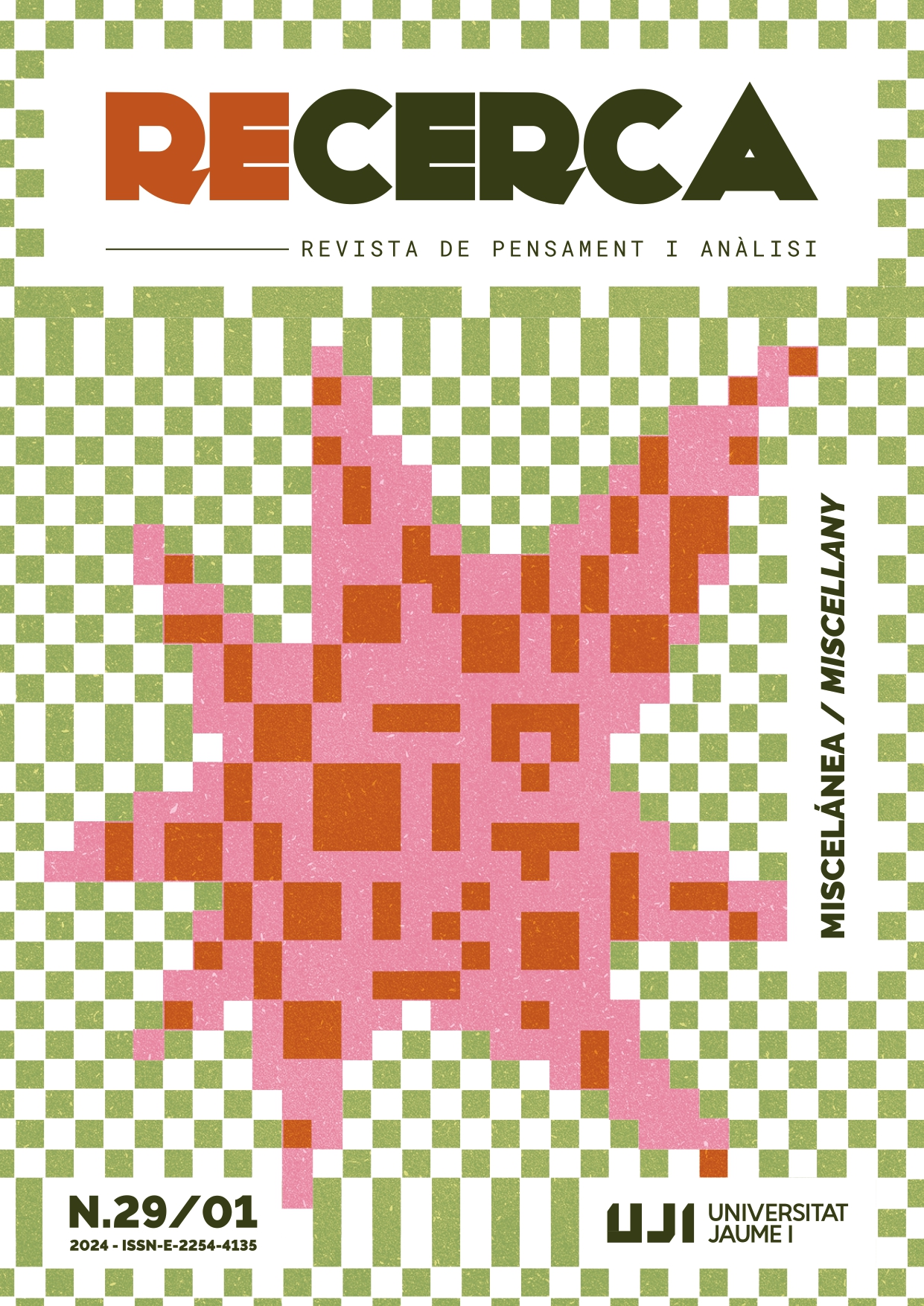F. Nietzsche in the Alt-Right: A distorted appropriation
Main Article Content
Abstract
In this article we examine the way in which the American Alt-Right movement has made Friedrich Nietzsche its most influential philosopher. The authors ascribed to the Alt-Right evidence a strong liking for the German philosopher's ideas, which resonate forcefully in many their principal policies: specifically, the characterisation of our contemporaneity as “decadent”, the comparison between “superior men” and the project to construct a “white ethnostate”, and the advocacy of Christianity, as opposed to Christianism, as an identity structure for defining white civilisation. Having trawled the main Alt-Right forums of ideological expression and analysed the key writings of their theorists, references and spokespersons, we aim to present a systematic explanation of how this advocacy has been built on certain Nietzschean themes. We also argue that this is a partial, superficial and contradictory reading of Nietzsche, as well as a narrow and distorted interpretation.
Downloads
Article Details
References
Bardamu, Ferdinand (2020). White Nationalism and its Leftist Enemies. Occidental Observer. Recuperado de: https://www.splcenter.org/fighting-hate/extremist-files/ideology/white-nationalist [Consultado el 18 de febrero de 2022].
Chatterjee, Ipsita (2021). Alt-right movement. Dissecting racism, patriar-chy and anti-inmigrant xenophobia. London: Sage Publications.
Derlin, F. Roger (2017). No Campus for White Men. American Renais-san-ce. Recuperado de: https://www.amren.com/features/2017/02/no-campus-for-white-men-scott-greer/ [Consultado el 2 de marzo de 2022]
Drochon, Hugo (2019). Nietzsche and the Alt-right. Further Adven-tures in the art of Missing the Point. The Philosopher, 107, 2.
Gray, Phillip W. y Jordan, Sara R. (2018). Revealing the Alt-right: Exploring Alt-right History, Tinkers and Ideas for Public Offi-cials. En VV. AA., Public Voices (31-50). Washington: Suffolk Uni-versity.
Hall, Joshna (2020). Newton contra Alt-right. Nietzsche: Dionysus as Androgynous Black Panther. The Pluralist, 15, 2, 110-128.
Hawley, George (2017). Making sense of the Alt-right. Columbia: Uni-versity Press.
Illing, Sean (2018). The Alt-right is Drunk on Bad Reading of Nie-tzsche. The Nazis were too. Vox. Recuperado de: https://www.vox.com/2017/8/17/16140846/alt-right-nietzsche-richard-spencer-nazism [Consultado el 25 de febrero de 2022].
Malloch, Ted (2017). Europa, Eurabia and the Last Man. Breitbart. Recupera-do de: https://www.breitbart.com/europe/2017/07/30/malloch-europa-eurabia-last-man/ [Consultado el 2 de marzo de 2022]
McCulloch, Richard (2019). Human Pre-History and the Making of the Races. Part 2: Genetic Distances. Occidental Observer. Recupe-rado de: https://www.theoccidentalobserver.net/2019/09/03/human-pre-history-and-the-making-of-the-races-part-2-genetic-distances/ [Consultado el 4 de marzo de 2022].
Nagle, Angela (2018). Muerte a los normies. Las guerras culturales en internet que han dado lugar al ascenso de Trump y la Alt-right. Ta-rragona: OrcinyPress.
Nietzsche, Friedrich (1998). Fragmentos Póstumos, 1885-1888. Barcelo-na: Península.
Nietzsche, Friedrich (2010). Más allá del bien y del mal. Madrid: Alian-za Editorial.
Nietzsche, Friedrich (2011a). Ecce Homo. Madrid: Alianza Editorial.
Nietzsche, Friedrich (2011b). El Anticristo. Maldición sobre el cristianis-mo. Madrid: Alianza Editorial.
Nietzsche, Friedrich (2011c). La genealogía de la moral. Madrid: Alianza Editorial.
Nietzsche, Friedrich (2015). Aurora. Madrid: Biblioteca Nueva.
Nietzsche, Friedrich (2016a). Así habló Zaratustra. Madrid: Alianza Editorial.
Nietzsche, Friedrich (2016b). La Gaya Ciencia. Madrid: Tecnos.
Odin Shaw, Daniel (2019). Something Old, Sometung New, Some-thing Borrowed: The Alt-right on Building Christendom With-out Christ. Journal of the Study of Religions and ideologies, 18, 54, 79-92.
Russell, Jesse (2021). Nietzsche and the American Right. So-ciety&Culture. Recuperado de: https://www.chroniclesmagazine.org/nietzsche-and-the-american-right/ [Consultado el 2 de marzo de 2022].
Spencer, Richard (2014a). Viking and the Pagan-Christian Synthesis (2 de diciembre de 2014). Radix Journal. Recuperado de: https://radixjournal.com/2014/12/vikings-pagan-christian-synthesis/ [Consultado el 1 de marzo de 2022]
Spencer, Richard (2014b). We need a Bismark. Radix Journal. Recupe-rado de: https://radixjournal.com/tag/otto-von-bismarck/ [Con-sultado el 1 de marzo de 2022].
Spencer, Richard (2015a). Enoch Powell’s Nietzschean Christianity. Ra-dix Journal. Recuperado de: https://radixjournal.com/2015/07/2015-7-19-enoch-powells-nietzschean-christianity/ [Consultado el 25 de febrero de 2022].
Spencer, Richard (2015b). Feminist as group Strategy. Radix Journal. Recuperado de: https://radixjournal.com/ [Consultado el 28 de febrero de 2022].
Spencer, Richard (2015c). The moral Disarmament of the White Race. Radix Journal. Recuperado de: https://radixjournal.com/tag/friedrich-nietzsche/ [Consultado el 28 de febrero de 2022].
Spencer, Richard (2016). Facing the Future as a Minority. Radix Jour-nal. Recuperado de: https://radixjournal.com/2016/09/2016-9-28-facing-the-future-as-a-minority/ [Consultado el 18 de febrero de 2022].
Spencer, Richard (2017). Richard Spencer’s Interview with Europe Maxi-ma. Radix Journal. Recuperado de: https://radixjournal.com/tag/friedrich-nietzsche/ [Consultado el 27 de febrero de 2022].
Spencer, Richard (2018). Nietzsche, the Judeo-Christian Legacy, and european unification. Radix journal. Recuperado de: https://radixjournal.com/tag/friedrich-nietzsche/ [Consultado el 17 de febrero de 2022].
Sunic, Tom (2020). Nietzsche (1900-2020): System Virtue-Signaling vs the Great Reaplacement. Occidental Observer. Recuperado de: https://www.theoccidentalobserver.net/2020/03/25/nietzsche %E1%9B%A3-1900-2020-system-virtue-signaling-vs-the-great-replacement/ [Consultado el 22 de febrero de 2022].
Thompson, C. Bradley (2020). The Rise and Fall of the Pajama-Boy Nietzscheans. The American Mind. Recuperado de: https://americanmind.org/salvo/the-rise-and-fall-of-the-pajama-boy-nietzscheans/ [Consultado el 2 de marzo de 2022]
Wegner, Nils (2020). The Absolute Essence. Radix Journal. Recupera-do de: https://radixjournal.com/2020/05/identity-in-2015-the-absolute-essence/ [Consultado el 16 de febrero de 2022].


